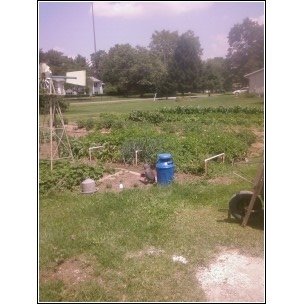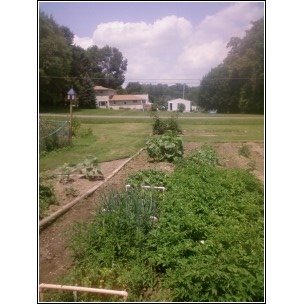Today while reading yet another news story about the affects of pesticides and herbicides on our envoirnment and us, I started thinking about why such things are produced. As much as I want to follow the crowd and point my finger at the chemical companies and large scale farmers who use these products, I can't without thinking WHY these chemicals exist and are used. Yes I know, chemicals are evil, and yes I know, there are alternative ways to farming, but for now, I am going to look at the big picture.
As I have written in many previous posts, there was a time when EVERYONE produced some, if not all, of their own food. This could have been on a farm, on the prarie, or the man in the mountains eating elk and wild berries. Everyone was responsible for themselves. But as the population grew, towns grew into cities, and people moved away to have "jobs", they needed to buy their food rather than produce it. Imagine in todays standards, comparing the need for food outsourcing in 1810 as compared to today in 2010.
I did a little research, actually very little, to find the population of the US in 1810 compared to today.The figures I used were from the first website that popped up showing all 3 dates that I wanted, so they may be rough estimates and not totally correct, but no matter what, the numbers are still staggering in comparison. The US population in 1810 was 7,240,000. In 1910, it was 92,228,000, and now in 2010, it is a whopping 299,867,000 people.
I couldn't find any figures as to percentage of people growing their own food in 1810 as compared today, but I'll assume the ratio then was a LOT higher than it is today. If I was to even figure that 10% of our population now grows their own food, the number is still higher than the total population in 1810. Even as I sit here and type this, these figures still amaze me.
So what do all these figures have to do with chemicals like herbicides and pesticides? You have to figure how much food has to be produced to feed this gigantic number of people today, and factor in how many actual farms are left in the US. These farmers have to produce X amount of food to send out due to demand, but they also have to produce that same amount to even turn a profit. With the use of thse chemicals, their work load is reduced, cutting them down on labor costs and overhead. Imagine, really sit and think, about how much food it takes to feed nearly 300 MILLION people in comparison to the 7 million people 200 years ago. That's a LOT of food.
Don't think I am sitting here agreeing with the use of such chemicals with no thoughts of long term affects on our enviornment or ourselves. I care just as much as anyone else who is reading this. I will never agree with spraying fields with pesticides, or growing corn that is genetically modified to contain its own herbicide within itself. I disagree with ALL of these practices. But....I do understand WHY those things are used. We simply could not afford to produce food for 300 million people using all natural and organic methods, making them affordable, reliable, and capable of turning a profit for the farmer.
Now...with all this being said, it's time to take a stand. I don't mean send letters to the chemical companies, or refuse to buy a certain brand of canned corn, I mean produce your own. At this point in time folks, growing your own food is a revolution. With just one small tomato plant you stick in the ground yourself, you're not buying this one thing from the store, and you're raising that middle finger to the chemical companies. With a garden, you're doing even more, you're starting a battle with them. You're raising BOTH fingers, and telling them that you don't need them. With everything you produce for yourself, you're less reliant on the machine, eating one less chemical laden food, and telling the big guys you don't need them.
I'm not going to write on and on this time, I've done that enough in the past with previous posts. I just want each of you to think about a few things. If everyone with the means to do so grew just SOME of their own food, how would this hurt these companies? If 10% of us grew a garden, thats 10% of everyone with some kind of property, how would THAT affect them? It's time to take back our food folks. Time to take it back to ourselves. Time to make it safe. Time to put it back in our own hands instead of the chemical companies and commercial farms. Think about it.
And just to refer you all to the article I was referring to, go read this:
http://blogs.discovermagazine.com/80beats/2010/03/02/common-weedkiller-chemically-castrates-frogs-turns-males-into-females/ It's some REALLY scary stuff to know that a hericide we are all ingesting has altered the sex in frogs. Just one more reason to think........
Saturday, March 6, 2010
Tuesday, March 2, 2010
Today I stopped to visit my folks for a bit, and mom surprised me with copies of pictures. They were pictures of my grandma's old house, which my grandfather built in the early 30's, and after he passed away, grandma raised 3 kids in by herself. I have a lot of fond memories of this place. The hand pump in the kitchen, evenings of watching late night tv with grandma and having massinve amounts of hot chocolate covered in marshmallow whip, and many Christmas's.
The place was wide open, with just a half wall seperating the kitchen from the living room. The room on the side was a bedroom that my dad, uncle, and aunt all shared while grandma slept on a rollaway bed she kept behind the couch. That bedroom (that sits lower than the main house) was origionally a chicken coop. The house was heated with a woodburner, though later it was converted to a radiant oil burner.
When my uncle built her the new house that I posted pictures of 2 weeks ago, she stayed next door at my aunts. She watched the dozer push over that house and cried all day. She started her life with my grandfather there. He built the house with his own two hands. She raised 3 kids there by herself. That tiny house was her life. My uncle just wanted better for her and had the means to do so, but my dad has never forgiven him for tearing it down and making his mother cry. She didn't like the new bigger house at first, but after getting used to quilting by a woodburner in a sewing room the size of the old house, she got used to it and got more comfortable.
While I could live with ease in something like this by myself, I cannot imagine raising 3 children in it. While I like to shun modern conviences and gadgets, I think of this house and can only imagine how hard it was. All of us have memories of that tiny house, and now I have pictures to look at and bring back more.
Sorry about the picture quality. My scanner is down, so these are pictures of a picture.
This view is of the right (east) side of the house. That door was rarely used, and was boarded and sided over not far after these were taken. It's hard to tell on these pictures, but the house was not on the ground. It was on wooden stilts and cement blocks.

This is the back of the house. That room to the left is the bedroom made from a chicken coop. The place never had shingles, only tarpaper. That door opened into the kitchen, and the living room started roughly 8 feet to the left. The sink with hand water pump was right under that back window.

This is the other side by the driveway. Note the size of the car in comparison to the house. Yea, it was tiny. That mirror on the right of the picture was on an old GMC stakebody truck that belonged to my uncle. The back was enclosed with wood, and it was always our "fort" when we played at grandma's. That driveway was lined with tiny rubber cutouts about the size of a penny from molds where grandma worked her second job. (she was a school custodain in the day and worked in a rubber shop in the evenings) She brought them home in buckets and poured them onto the drive since she could never afford gravel. I wish I still had one as a momento, but I don't.
Subscribe to:
Comments (Atom)
Blog Archive
-
►
2019
(1)
- ► Apr 7 - Apr 14 (1)
-
►
2016
(1)
- ► Jan 31 - Feb 7 (1)
-
►
2013
(1)
- ► Sep 1 - Sep 8 (1)
-
►
2012
(3)
- ► Jun 10 - Jun 17 (1)
- ► Jun 3 - Jun 10 (2)
-
►
2011
(17)
- ► Nov 27 - Dec 4 (1)
- ► Nov 20 - Nov 27 (1)
- ► Nov 13 - Nov 20 (1)
- ► Oct 2 - Oct 9 (1)
- ► Jul 24 - Jul 31 (1)
- ► Jun 12 - Jun 19 (1)
- ► Mar 27 - Apr 3 (1)
- ► Mar 20 - Mar 27 (2)
- ► Mar 13 - Mar 20 (3)
- ► Mar 6 - Mar 13 (2)
- ► Feb 27 - Mar 6 (3)
-
▼
2010
(51)
- ► Dec 5 - Dec 12 (1)
- ► Nov 7 - Nov 14 (3)
- ► Aug 29 - Sep 5 (1)
- ► Aug 15 - Aug 22 (1)
- ► Aug 1 - Aug 8 (1)
- ► Jul 25 - Aug 1 (1)
- ► Jul 18 - Jul 25 (1)
- ► Jul 11 - Jul 18 (1)
- ► Jun 27 - Jul 4 (1)
- ► Jun 20 - Jun 27 (2)
- ► Jun 13 - Jun 20 (2)
- ► Jun 6 - Jun 13 (3)
- ► May 30 - Jun 6 (1)
- ► May 23 - May 30 (2)
- ► May 16 - May 23 (1)
- ► May 9 - May 16 (1)
- ► May 2 - May 9 (2)
- ► Apr 11 - Apr 18 (2)
- ► Apr 4 - Apr 11 (3)
- ► Mar 28 - Apr 4 (2)
- ► Mar 21 - Mar 28 (1)
- ► Mar 14 - Mar 21 (3)
- ► Mar 7 - Mar 14 (2)
- ▼ Feb 28 - Mar 7 (2)
- ► Feb 21 - Feb 28 (1)
- ► Feb 14 - Feb 21 (1)
- ► Feb 7 - Feb 14 (1)
- ► Jan 31 - Feb 7 (1)
- ► Jan 24 - Jan 31 (1)
- ► Jan 17 - Jan 24 (1)
- ► Jan 10 - Jan 17 (3)
- ► Jan 3 - Jan 10 (2)
-
►
2009
(100)
- ► Dec 27 - Jan 3 (2)
- ► Dec 20 - Dec 27 (1)
- ► Dec 13 - Dec 20 (1)
- ► Dec 6 - Dec 13 (1)
- ► Nov 29 - Dec 6 (1)
- ► Nov 22 - Nov 29 (2)
- ► Nov 15 - Nov 22 (1)
- ► Nov 8 - Nov 15 (2)
- ► Nov 1 - Nov 8 (1)
- ► Oct 18 - Oct 25 (1)
- ► Oct 11 - Oct 18 (1)
- ► Oct 4 - Oct 11 (1)
- ► Sep 20 - Sep 27 (1)
- ► Sep 13 - Sep 20 (4)
- ► Aug 30 - Sep 6 (2)
- ► Aug 23 - Aug 30 (2)
- ► Aug 16 - Aug 23 (2)
- ► Aug 9 - Aug 16 (2)
- ► Aug 2 - Aug 9 (2)
- ► Jul 26 - Aug 2 (2)
- ► Jul 19 - Jul 26 (4)
- ► Jul 12 - Jul 19 (2)
- ► Jul 5 - Jul 12 (2)
- ► Jun 28 - Jul 5 (2)
- ► Jun 21 - Jun 28 (1)
- ► Jun 14 - Jun 21 (2)
- ► Jun 7 - Jun 14 (1)
- ► May 24 - May 31 (2)
- ► May 17 - May 24 (2)
- ► May 10 - May 17 (2)
- ► May 3 - May 10 (1)
- ► Apr 26 - May 3 (2)
- ► Apr 19 - Apr 26 (2)
- ► Apr 12 - Apr 19 (4)
- ► Apr 5 - Apr 12 (2)
- ► Mar 29 - Apr 5 (1)
- ► Mar 22 - Mar 29 (2)
- ► Mar 15 - Mar 22 (4)
- ► Mar 8 - Mar 15 (4)
- ► Mar 1 - Mar 8 (2)
- ► Feb 22 - Mar 1 (2)
- ► Feb 15 - Feb 22 (4)
- ► Feb 8 - Feb 15 (4)
- ► Feb 1 - Feb 8 (4)
- ► Jan 18 - Jan 25 (5)
- ► Jan 11 - Jan 18 (3)
- ► Jan 4 - Jan 11 (2)
-
►
2008
(63)
- ► Dec 28 - Jan 4 (3)
- ► Dec 21 - Dec 28 (1)
- ► Dec 14 - Dec 21 (3)
- ► Nov 30 - Dec 7 (2)
- ► Nov 23 - Nov 30 (2)
- ► Nov 16 - Nov 23 (1)
- ► Nov 9 - Nov 16 (2)
- ► Oct 26 - Nov 2 (2)
- ► Oct 19 - Oct 26 (3)
- ► Oct 12 - Oct 19 (3)
- ► Oct 5 - Oct 12 (5)
- ► Sep 28 - Oct 5 (1)
- ► Sep 21 - Sep 28 (1)
- ► Sep 14 - Sep 21 (1)
- ► Sep 7 - Sep 14 (33)










